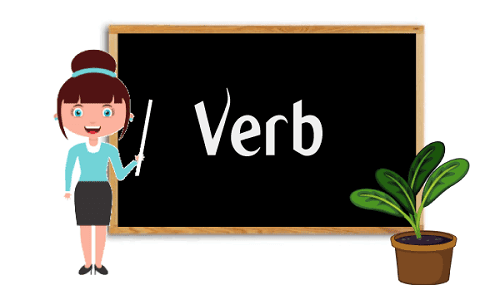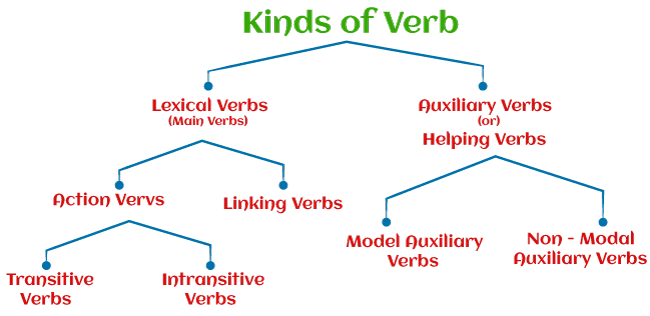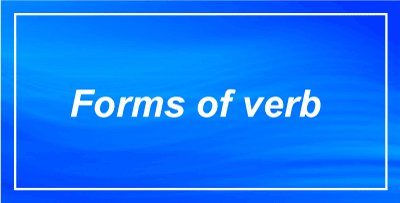VerbThe verb is one of the parts of speech. It is a word that tells something about a person or thing. It tells us about an action that is what a person or thing does, an occurrence that is what is done to a person or thing, a state of being that is what a person or thing is, and belongings that means the ownership.  To understand the verb clearly looks at these sentences- He hits the ball hard. ( Here the word 'hit' is a verb that shows action)
- The window is broken. ( Here, the word 'broken' is a verb that shows what is done to the thing)
- I am fine. (Here, the word 'fine' is a verb that shows a state of being).
- Rohan has a new car. (Here, the word 'has' is a verb that shows belonging and ownership).
Further, the verb also tells the tense of an action. It means the verb tells whether an action happened in past time, or it happens now in present time, or it will happen in the coming time in future. - To show the present time of an action verb is, am, are, has, have, do, does, is jumping, are eating, am going, has written, and have sent are used.
- To show the past time of an action verb was, were, had, was playing, were dancing, and had gone are used.
- To show the future time of an action verb will do, shall go, will be coming, shall be going, will have written are used.
In a sentence, there may be a single verb or may also be double or more than two verbs. Examples: - Rohan writes properly. (Here 1 verb (writes)).
- Rohan is writing properly. (Here 2 verbs (is, writing).
- Rohan has been writing well. (Here 3 verbs (has, been, writing).
The verb consists of two or more words is known as 'verb phrase'. The verb phrase expresses what the subject 'does', 'did', 'has don', or 'will do' Kinds of Verb Look at the above diagram. Verb has two main kinds 'lexical verb' and 'auxiliary verb', also called 'helping verb'. Lexical Verbs:It is also called the main verb. It denotes an action of a sentence. It also has two parts 'action verb' and 'linking verb'. - Action verb: It describes the physical and mental action. It tells us what a person, thing, or animal does (action). E.g., Eat, drink, jump, think, feel, fall and walk.
Examples of action verbs in sentences- Children play in the garden.
- Anu eats food slowly.
- Monkey jumps on the tree.
- The sun rises in the east and set in the west.
- The earth revolves around the sun.
- Linking verb: It connects the subject with a compliment.
Examples:- Sky is blue. (Here 'is' is the linking verb that links the subject 'sky' with the complement 'blue'.
- The boys are good-looking. (Here 'are' is the linking verb that links the subject the boys with the complement good looking).
- The best book shops are near the university. (Here 'are' is the linking verb that links the subject best book shops with the complement near the university).
Further, action verb is divided into two parts, 'transitive verbs' and 'intransitive verb'. i) Transitive verb: Transitive verbs are verbs that have an object which is affected by the action of the verb. Examples: - John is painting the wall. (Here, 'painting' is the transitive verb and affects the object 'the wall').
- My mother is cooking food. (Here, 'cooking' is the transitive and affects the object 'food').
Note: we can make the passive form of the transitive verb.ii) Intransitive verb: Intransitive verbs are verbs that do not have an object. Examples: - Birds fly. (Here, 'fly' is the intransitive verb that doesn't have any object).
- Girls danced. (Here, 'danced' is the intransitive verb that doesn't have any object).
Note: we cannot make the passive form of the intransitive verb.Auxiliary verb or Helping verb- Auxiliary verbs are verb that helps the main verb in a sentence. These are the forms of 'be', 'do', 'have', and also are the 'modal' verbs. The auxiliary verbs also help in the making of negative and interrogative sentences. These auxiliary verbs are divided into two parts, 'modal verbs' and 'non-modal' verbs.
i) Non-modal auxiliary verbs: The 'be' forms of verb (is, am, are, was, were, been, being); 'have' forms (has, have, had); and 'do' forms (do, does, and did) are the non-modals verbs. Basically, these verbs help in the formation of tense as well as in the formation of negative and interrogative sentences. Examples: - I am playing in the garden. (Here, 'am' is expressing the present tense).
- He is playing in the garden. ( Here 'is' is also expressing the present tense)
- They are playing in the garden. (Here 'are' is expressing the present tense)
- He was playing in the garden. (Here, 'was' is expressing the past tense).
- They were playing in the garden. (Here, 'were' is expressing the past tense).
- He has played in the garden. (Here, 'has' is expressing the present tense).
- They have played in the garden. (Here, 'have' is expressing the present tense).
- We had played in the garden. (Here, 'had' is expressing the past tense).
- He does not play in the garden. (Here, 'does' is expressing the negative sentence in present tense).
- We do not play in the garden. (Here, 'do' is expressing the negative sentence in present tense).
- They did not play in the garden. ( Here, 'did' is expressing the negative sentence in past tense).
- Is he playing in the garden? Were they playing in the garden? Have we played in the garden? Had they played in the garden? Does he play in the garden? Did you play in the garden? (These are interrogative sentences formed by the non-modals auxiliary verb.
ii) Modals auxiliary verb: Modals auxiliary verb helps to express the idea of ability, possibility, duty, and so on. They do not change with the person or number of the subject. With modal verbs, the action verb is always in its root form (I form). The modal verbs are; shall, will, should, would, can, could, may, might, used to, ought to, need, dare, must. Note: 'shall/will' is also used to express the future tense.Examples: - Radha can do this work properly. (Here 'can' is expressing the ability)
- Could I use your pen? (Here 'could' is expressing the permission)
- It may rain today. (Here 'may' is expressing possibility)
- Rima is in Delhi; she might visit us. (Here 'might' is expressing possibility)
- You should help the poor. ( Here 'should' is expressing the advice)
- We must stop at the red signal. (Here 'must' is expressing the compulsion)
- Would you like to have tea or coffee? (Here 'would' is expressing the option).
- I shall go on tour tomorrow. (Here 'shall' is expressing the action about future)
- Gandhiji used to spin for an hour daily. (Here 'used to' is expressing the past habit)
- People ought to be a bit nicer to us. (Here 'ought to' is expressing the expectation)
- Silvia needs to buy a new car. (Here, 'needs to' is expressing requirement).
Note: Need to is both modal and non-modal auxiliary verb.- How dare you do that to me! (Here, 'dare' is expressing courage).
Some other kinds of verbCausative verb: The causative verb is called so because they cause or allow someone or something else to happen. The words like let, have, make, get, help, etc., are causative verbs. Examples: - Let him do what he wants.
- They have their food at night.
- He will get his hair cut tomorrow.
- She makes him laugh.
- He is not allowed to go inside the classroom.
- My coach helped me in the practice match.
Forms of Verb There are five forms of the verb, in which the original form is the first form of the verb in the present tense and plural number. Now all forms of the verb, in brief, are given below: - V1: It is the first form of the verb, also called root, base, and original form of the verb. It is also in the present form and in the plural number. It is used in the simple present tense.
Examples: come, go, eat, drink, write, dance, play, read, etc. - V2: It is the second form of the verb. It is the past form of the verb used with both singular and plural subjects. It is used in the simple past tense.
Examples: came, went, ate, drank, wrote, danced, played, read, etc. - V3: It is the third form of the verb. It is the perfect form of the verb and is used with both singular and plural forms of the verb. It is used in the present perfect tense, past perfect tense, and future perfect tense.
Examples: come, gone, eaten, drunk, written, danced, played, read, etc. - V4: It is the fourth form of the verb, also called the 'ing' form of the verb. It is the continuous form of the verb and is used with both singular and plural subjects. It is used in present continuous tense, past continuous tense, future continuous tense.
Examples: coming, going, eating, drinking, writing, dancing, playing, reading, etc. - V5: It is the fifth form of the verb. It is the s/es, the singular form of the verb. It is also the present form of the verb used in the simple present tense.
Examples: comes, goes, eats, drinks, writes, dances, plays, reads, etc.
Other forms of verbRegular & Irregular verb- Regular verb: Regular verbs are verbs that follow a pattern by adding 'ed' in their past form and past participle form.
Examples:
| Base form | Past form | Past participle form |
|---|
| flow | flowed | flowed | | play | played | played | | laugh | laughed | laughed | | walk | walked | walked | | admire | admired | admired |
- Irregular verb: Irregular verbs are verbs that do not follow the same pattern. They form their past form and past participle form differently.
Examples:
| Base form | Past form | Past participle form |
|---|
| cut | cut | cut | | Bring | Brought | Brought | | Write | wrote | written | | Get | Got | Got | | know | Knew | Known |
Finite & Non-finite Verb- Finite verb: The verb that shows tense, person, and the number is called a finite verb. In other words, if the form of the verb is changed according to the number and person of the subject, that is a finite verb.
Examples:- He goes to the market.
- I go to the market.
- They were looking at the family photos.
- He was looking at the family photos.
- The patient had died before the doctor arrived.
- Non-finite verb: The verb that does not show tense, person, and number is called a non-finite verb. In other words, if the verb form does not change according to the number and person of the subjects, that is a non-finite verb. There are three forms of non-finite verbs:
- Infinitives: To + V1 (E.g., To respect our parents is our duty).
- Gerund: V1 + ing = V4 (E.g., Walking is good for health).
- Participle: present participle (V4) (E.g., Coming downstairs, she saw the man running away).
Past participle (V3) (E.g., Tired after the day's work, the farmer sat down to rest a little).
Perfect participle (having + V3) (E.g., Having rested, we continued our journey).
Phrasal VerbsWhen a verb takes another verb and an adverb and a preposition after it, then it becomes a 'phrasal verb'. Example: 'look' and 'after' have their different meaning, but together as a phrasal verb, it makes the meaning "to care of something and someone". It is also called an idiomatic expression. Examples of phrasal verbs in sentences are given below: - She gave only a lame excuse for her absence. (lame excuse)
- These days he is in his boss's good book. (in one's good book)
- I found him sitting alone with a long face. (long face)
- They lay in wait for the enemy. (lie in wait)
- Don't leave your friend in the lurch. (leave in the lurch)
Prepositional VerbsThe main verbs that are followed by a preposition are called the prepositional verbs, E.g., wait for. Examples of the prepositional verb in the sentence are given below: - You must account for the money you spent. (account for)
- It is bad for a student to answer back. (answer back)
- The thief who stole my watch is beaten up. (beat up)
- Thieves had broken in while we were away. (break in)
- Our principal comes from a respectable Hindu family. (come from)
The active and passive form of the verbThe verb form in the active sentence is not the same as in the passive sentence. When the active sentence is changed into a passive sentence, the verb form of the active sentence changes into its third form, the past participle form. Before the III form of the verb, the 'to be' form (is, am, are, was, were, been, being) is used according to the tense, number, and person of the sentence. To understand the changes of the verb, from active to passive sentence, look at the below sentences. - John helps the girls. (active) simple present tense
The girls are helped by John. (Passive) - John helped the girls. (active) simple past tense
The girls were helped by John. (Passive) - John will help the girls. (active) simple future tense
The girls will be helped by John. (Passive) - John is helping the girls. (active) present continuous tense
The girls are being helped by John. (Passive) - John was helping the girls. (active) past continuous tense
The girls were being helped by John. (Passive) - John has helped the girls. (active) present perfect tense
The girls have been helped by John. (Passive) - John had helped the girls. (active) past perfect tense
The girls had been helped by John. (Passive) - John will have helped the girls. (active) future perfect tense
The girls will have been helped by John. (Passive)
When there is a modal verb in the active sentence, then in the passive sentence, the structure is modal verb + be + V3. Examples: - Rohan can win the prize. (active)
The prize can be won by Rohan. (Passive) - A doctor should examine me. (active)
I should be examined by a doctor. (Passive) - The management must send a reply. (active)
A reply must be sent by the management. (Passive)
Subject-Verb Agreement In subject-verb agreement, the agreement exists between the subject of a sentence and the verb taken by it. There are some rules on which this agreement is based. The rules of subject-verb agreement are given below: i) Subjects and verbs of a sentence must agree in number and person. It means if the subject of a sentence is singular, it must go with a singular verb, and if the subject of a sentence is plural, it must go with a plural verb. Examples: - Boys play football. (here 'boys' is plural subject, so it takes plural verb 'play')
- The boy plays football. (here 'boy' is a singular subject, so it takes singular verb 'plays')
Note: In the formation of the number of the subject and verb, the suffix 's' and 'es' plays a very important role. Look at the examples given below:| Singular subject | Plural subject |
|---|
| boy | boys | | bird | birds | | mango | mangoes | | bus | buses |
In the formation of the plural subject, the suffix 's' or 'es' is added to the singular subject. See the above table. | Singular verb | Plural verb |
|---|
| goes | go | | fly | flies | | eats | eat | | plays | play |
In the formation of the plural verb, the suffix 's' and 'es' is removed from the singular verb. The root and base form of the verb is always plural, so to make it singular, 's' and 'es' is added to it. Examples: - He goes to school.
- They go to school.
- Birds fly in the sky.
- Bird flies in the sky.
ii) When two or more singular subjects are joined by and, then the plural verb form is used. Examples: - Platinum and gold are precious metals.
- He and I were playing.
- Are John and Ajay at home?
- The lion and the goat live in peace and harmony in this century.
Note: If the two subjects are separated by and but suggest one idea or refer to the same person or thing, the verb is singular.Examples: - Time and tide waits for none.
- The great thinker and philosopher is about to come today.
- Is bread and butter his only food?
iii) With each, every, everyone, many a singular form of the verb is used. Examples: - Each boy and girl needs to come on time.
- Everyone in the meeting accepts the proposal.
- Many a man does not know his own good deeds.
- Every man and woman follows the rule of society.
iv) When two singular subjects are joined by neither, nor, or, either, not only/ but also the verb form is singular. Examples: - Neither of the two girls is very intelligent.
- Neither he nor I is going for the picnic.
- Not only John but also George was selected for the tournament.
- Either Ram or Sita has done this work.
v) When the two plural subject joined by either, neither, nor, or, not only/but also, the verb form is plural. Examples: - Neither lions nor tigers are under threat from any predators.
- Either boys or girls were qualified for the final match.
vi) When the two subjects of different person or numbers are joined by either, neither, or, nor the verb form is according to the nearest subject. Examples: - Either you or we are the winner of the match.
- Neither the students nor the teacher is interested in class.
- Either you or I am responsible for the mistake.
vii) When two subjects are joined by with, together with, and as well as, the verb is according to the first subject. Examples: - The mayor with the councilors is to be present.
- The councilors with the mayor are to be present.
- The leader, as well as the house captains, was honoured by the principal.
- The house captains, as well as the leader, were honoured.
viii) With units of measurement and time, the singular verb form is taken. Examples: - Two liters of milk is sufficient for a day for a family of four.
- Ninety-thousand money is a large sum of money.
ix) Collective nouns expressing the idea of oneness take the singular verb form. Examples: - The mob was getting out of control.
- The class does not like boring and long lectures.
- The team has played very well.
- The crew on the ship was enjoying the voyage.
- A herd of cows was grazing in the field.
Note: when the individual members of the group are thought of, then the plural form of the verb is taken. Examples:- The jury was unanimous in its verdict. (all the members of the jury as a single body)
- The jury were divided in their verdict. ( individual members of the jury)
x) Titles of the books, movies, etc., are followed by a singular form of the verb. Examples: - The moral stories of panchatantra is a very popular children's book.
- The games of throne is a very famous TV series.
xi) Some nouns like new, physics, furniture, etc., are look plural but are singular and take the singular form of verbs. Examples: - My new furniture is very beautiful.
- Physics is my favorite.
- The news of the terrorist attack spreads soon.
xii) Some nouns like scissors, trousers, jeans, spectacles, shoes, etc., are plural and take plural forms of the verb, but if they are used with 'a pair of', it acts as a singular noun and takes the singular form of the verb. - My shoes are very expensive.
- My pair of shoes is expensive.
- Your spectacles look imported.
- Your pair of spectacles looks imported.
|



